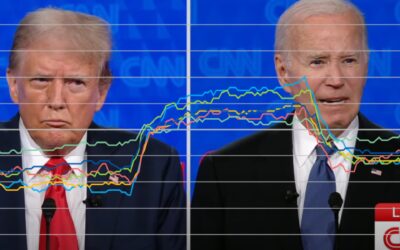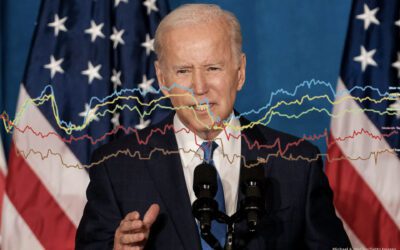The latest public polls reveal a political environment whose broad contours remain fixed — a deeply unpopular president, broad pessimism about the direction of the country and the political process, a significant electoral advantage for Democrats, and a growing demand to bring our troops home from a war in Iraq that is viewed as a mistake by an increasingly large majority of Americans. Within this context, we see President Bush’s approval marks reaching new lows, but even his approval now exceeds that of the Congress. Americans still view Democrats more favorably and hold out some optimism for the Democratic majority in Congress, but they believe that Democrats have failed to deliver the change they promised. Democrats maintain a double-digit margin in a generic congressional match-up, but this advantage is now more a reflection of Republican weakness than Democratic strength.
As summer heats up across the country, public polls released over the last few weeks still reveal a political environment that is stubbornly resistant to major changes. Certainly, there have been some notable shifts in the last month and a half. President Bush’s job approval marks have once again reached a new low. Similarly, views of the country’s direction have also reached their most pessimistic point in nearly 15 years. And the number of Americans who believe the war in Iraq was a mistake as climbed over 60 percent for the first time in the latest Gallup poll. Of course, these shifts really reflect slow but inexorable trends that have been at work consistently for a year or more. The big picture remains essentially unchanged – a tremendously unpopular president and administration, broad pessimism about the direction of the country and our government, an unmistakable Democratic electoral advantage, and a growing desire to bring our troops home.
Eight separate surveys conducted through June and early July show the number of Americans who believe the country is headed in the right direction dropping to just 24 percent, with 70 percent now convinced that the country is off on the wrong track. The latest CBS News poll shows a majority of Republicans (52 percent) now joining 86 percent of Democrats and 80 percent of Independents in rejecting the country’s current direction. Consumer confidence, influenced strongly by gas prices, has been much more volatile than other measures of the political environment this year, but the ABC News/Washington Post Consumer Comfort Index stands at -9 this week – down 2 points this week, 3 points below its average for the year, and even with its average over 21 years of weekly polling. Looking at the economy as a whole, only 23 percent in a mid-June Gallup poll said the economy was getting better while 70 percent felt it was getting worse.
President Bush’s ratings reflect the deep pessimism felt by such a large majority of Americans. After remaining in a narrow range between 33 and 35 percent each of the first five months of the year, Bush’s overall job approval dropped to 31 percent in June, with disapproval also reaching a new high of 63 percent. This month, that trend continues – through four polls conducted in July, Bush’s approval stands at just 29 percent, with disapproval up to 65 percent. As usual, the FOX poll has the best net job approval numbers for Bush (31 percent approve, 60 percent disapprove), but even this survey puts Bush’s approval at just 21 percent among Independents.

Historically, only Truman (22 percent) and Nixon (23 percent) have ever recorded lower approval marks than Bush. With 18 long months left in his term and no sign of political recovery in sight, it is increasingly likely that Bush could soon break their ignominious records.
Measures of Bush’s performance on a variety of issues once thought to be political strengths reveal the extent of his current political weakness. On Iraq, barely 1-in-4 (27 percent) now approve of the job Bush is doing while 68 percent disapprove. His marks in the campaign against terrorism are only slightly better (39 percent approve, 53 percent disapprove). And a strongly negative rating among Republicans gives Bush his lowest approval mark on immigration (20 percent approve, 65 percent disapprove). Approval for Bush’s handling of the economy (36 percent approve, 60 percent disapprove) has barely moved in two years and, while still dismally low, now actually ranks higher than his overall approval.
Clearly, Bush’s recent actions on a number of fronts have added to his woes. Less than 1-in-5 Americans agreed with his decision to commute Scooter Libby’s sentence (13 percent) or say he should have given Libby a full pardon (6 percent), while 2-in-3 say Bush was wrong to get involved in the sentencing at all (66 percent). Of course, Bush’s decision to commute Libby’s sentence was made in reaction to an outcry among certain segments of the Republican base. However, only 9 percent of self-identified Republicans and Republican leaning Independents in the Gallup survey say his handling of the affair caused them to gain confidence in him; 16 percent lost confidence in Bush as a result of this situation, and 71 percent say it didn’t impact their opinion of Bush. By comparison, Bush’s handling of the immigration issue has left 10 percent of these partisans more confident but 39 percent less confident, with 50 percent saying it has had no impact on their opinion of him.
The only good news for Bush is that the Congress, now under Democratic control, is not faring much better in terms of overall job approval in these recent surveys. After a short post-election honeymoon, congressional approval marks have once again fallen near their pre-election levels. The AP/Ipsos poll puts approval of Congress even lower than President Bush – 24 percent approve, 70 percent disapprove. However, voters are still drawing clear distinctions between the two parties in Congress, with Democrats earning significantly higher marks. The FOX survey finds a difference of 13 points in net approval for the two parties in Congress, while the CNN poll finds majorities of Americans still offering positive opinions of the Democratic Party (51 percent favorable, 38 percent unfavorable) and negative views of the Republican Party (36 percent favorable, 53 percent unfavorable).
Democrats are certainly not free of blame for the current ratings of Congress, and the public is growing increasingly frustrated with what they view as a failure by Democrats to deliver the change which fueled their victory in November. For the first time, the CNN poll finds negative marks for the work of the Democratic leaders in the House and Senate (42 percent approve, 49 percent disapprove), down markedly from their marks in early May (49 percent approve, 44 percent disapprove). And by a margin of almost 4-to-1, the CBS poll shows Americans believe this Congress has accomplished less than usual in its first six months (16 percent more, 59 percent less); even a majority of Democrats agree with this assessment.
Despite these concerns, the CNN poll finds that Americans still say it is good for the country that Democrats are in control of Congress – 57 percent good for the country, 31 percent bad for the country. After some slippage on this measure in the spring, it is now essentially back to where it stood at the beginning of the year. And the same poll shows Democrats maintaining both majority support and a huge margin in the generic congressional contest (53 to 41 percent). Democrats’ electoral strength may be due as much to Republican weakness as their own strength at this stage, but it remains steady nonetheless.
As has been the case for over a year now, Iraq is the dominant issue driving this political environment. Bush’s steadfast support for failed policies and his refusal to acknowledge the reality of the military and diplomatic situation both in Iraq and the Middle East as a whole have helped lead him to historic lows in job approval, and congressional Republicans’ failure to stand up to Bush is a top reason for the marginalized position and deep unpopularity they now suffer. While different question wording and surveys often produce seemingly conflicting results when measuring public opinion on Iraq, the latest polls reveal certain data and trends that are unmistakable:
- 62 percent in the Gallup poll now say sending troops into Iraq was a mistake – the highest level yet
- Only 17 percent of Americans across two surveys believe the ‘surge’ is making the situation in Iraq better; 27 percent say it is making the situation worse, and 51 percent believe it is making no real difference
- A majority in the CBS poll believe current American involvement in Iraq is actually creating more terrorists rather than less
- Support for various formulations that include removing U.S. troops from Iraq within the next year consistently exceeds 60 percent
- 61 percent in the newest Newsweek release believe Iraqi leaders are either unwilling or unable to negotiate a viable power-sharing agreement, and 55 percent feel the readiness of Iraqi troops should not be a condition for the withdrawal of U.S. troops




